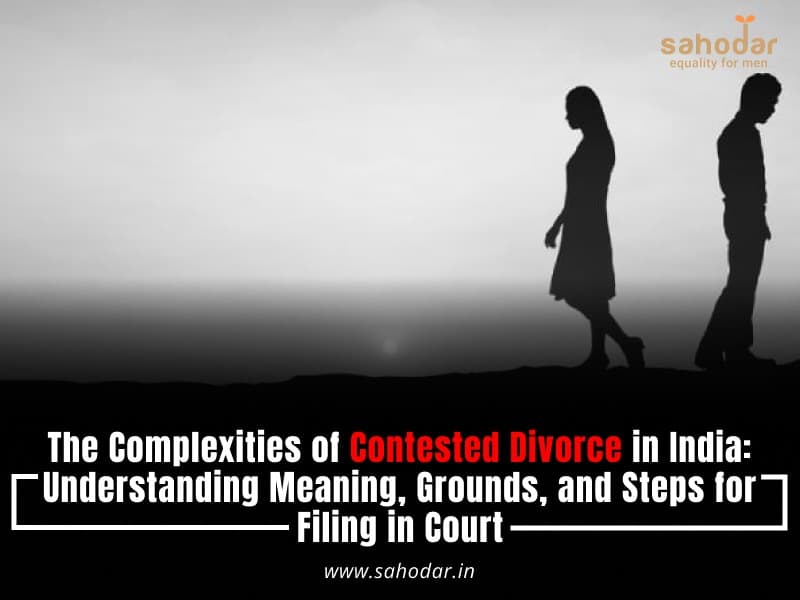Understanding the Process of Filing for Divorce in India
When a marriage breaks down and the two parties involved cannot continue to live together as a couple, the process of divorce is initiated. Filing for contested divorce not only affects the couple but also their families. Divorce can either be Mutual Consent or Contested. Mutual Consent Divorce is when both parties agree to end the marriage, whereas Contested Divorce is when one party is not willing to end the marriage. The process of Mutual Consent Divorce is relatively quicker, taking around 6 to 9 months, whereas Contested Divorce in India can take anywhere from 2 to 3 years or even longer in some cases. The latter is usually filed by one party against the other’s wishes.
Defining Contested Divorce
Understanding Contested Divorce in India: When One Party is Willing, but the Other is Not.
Contested Divorce, also known as One-Sided Divorce, occurs when one party is willing to dissolve the marriage, but the other party is not. The decision to separate is not mutually agreed upon by both parties. This type of divorce takes place when one spouse has grounds for separation and the desire to end the marriage. In a contested divorce, both parties will hire separate lawyers to represent their interests and contest against each other in court.
Understanding the Grounds for Contested Divorce
Grounds for Contested Divorce: Understanding the Basis for Separation.
As per Section 13 of the Hindu Marriage Act, 1955, there are various grounds on which a Contested Divorce can be filed in India. These include:
- Adultery: When one spouse engages in sexual relationships outside of the marriage.
- Cruelty: When one spouse causes harm, annoyance, or disturbance to the other, leading to problems in the relationship.
- Desertion: When one spouse willingly and knowingly abandons the other without any justifiable reason and with no intention of returning.
- Conversion: When one spouse forces the other to convert to another religion.
- Mental disorder: When one spouse is suffering from any kind of mental disability.
Determining the Appropriate Court for a Contested Divorce
Understanding Jurisdiction
When filing for a Contested Divorce, it is important to understand which court has jurisdiction over the case. The Family Court is the appropriate court for such cases. Jurisdiction can be determined based on several factors such as:
- The location of the marriage ceremony
- The last address where both parties lived together as a couple
- The current address of both parties.
It is important to note that the jurisdiction of the court can vary depending on the specific circumstances of the case and it is advisable to consult with a lawyer to determine the appropriate court.
The Step-by-Step Process of Filing for a Contested Divorce in India
Filing for a Contested Divorce in India: A Step-by-Step Guide.
To contest a divorce in Indian courts, the following procedure must be followed:
- Filing the Divorce Petition: A well-drafted Contested Divorce petition must be submitted to the Family Court by an experienced Family Lawyer. Once the petition is filed, summons will be issued to the other spouse as notification.
- Reply by the Opposite Party: Once the summons is sent, the opposite party may submit a reply in the court, outlining their side of the story with the assistance of an experienced Divorce Lawyer.
- Interim Decision: The court may order mediation to try settling the dispute amicably between both parties before granting the divorce. This is conducted by a neutral person who helps both sides understand and solve the issue.
- Evidence Stage: If mediation is not successful, the proceedings of evidence begin, in which both parties must submit their respective evidence as proof. Examination and cross-examination are taken first from the petitioner and then from the opposite party.
- Argument Stage: Once evidence is filed, both parties are called for final argument. On this basis, the court finalises the dissolution of the marriage.
- Final Divorce Decree: The final judgement is passed and the divorce decree is provided by the court. Once the divorce decree is passed, both parties must sign the divorce papers to bring the proceedings to an end.
- Appeal: If either party is not satisfied with the order, an appeal can be filed in the higher court within 3 months of the order date.
It should be noted that in contested divorce cases, other petitions such as Maintenance, Alimony, Child custody, and Property Separation also need to be dealt with. In Mutual contested divorce, it is handled mutually by both parties.”

